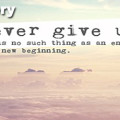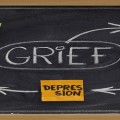
I wanted to include an essay from this past month’s LOSS (Loving Outreach to Survivors of Suicide) newsletter. I really struggled with being vulnerable with my feelings and being able to process them, understand what I was feeling and expressing them. With the holidays coming up, I think we have to be aware of this. We all grieve differently, and not everything works for ever person. For some people (definitely myself included), it’s hard to externalize grief felt after a suicide. You’re so busy with other things — whether it’s dealing with the funeral, financial burden that you were left with, raising your children, and simply the day to day things we have to do in life (work, family, etc), we can easily push our emotions to the side. For me, finally realizing that I wasn’t expressing my feelings of loss helped me learn to be vulnerable with my feelings and work towards getting those feelings out. Please read below and let me know how you are all doing with externalizing the grief. I know I’ve learned coping skills from listening to others so I’d love to hear what you are doing.
From the Desk of…Jessica M.
“We all know that suicide is different. There is something about it that makes the grief process feel different and more complex. Suicide is traumatic; most of us never expected our loved ones to die in this way. Not only were their deaths unexpected and tragic, but many survivors walk in on the scene of death to discover their loved one’s body, and others witness their loved one’s death, each adding another complex layer of trauma to the already difficult and complex grieving process. I meet many people who heal and grow in the face of such trauma, but it is important to consciously recognize the pain of the loss and find some form of outward expression in order to promote healing.
In the LOSS Program we have people that call us the day that their loved one died and others who call 15 years later. Some survivors know that they are going to need immediate help coping and others realize much later that they never gave this grief thing any attention and that it has impacted all areas of their life in a negative way. In the aftermath of trauma we can “compartmentalize”—or put away painful memories until we have the time and energy to deal with them, or we can “numb out”—or detach from any awareness of these feelings. Compartmentalizing is a high level skill because it helps us function, but numbing out from any awareness of the pain can be manipulative and have long term effects on our own mental health. Denial can be a normal and healthy experience in the immediate aftermath of the suicide, but gradually allowing yourself to feel the grief is necessary for the healing process to begin.
At a recent speaking engagement one survivor stated, “I keep my grief right here on my hip. I cannot keep it in front of me, because it gets in the way of my functioning and I cannot keep it behind me because I cannot see it and when I cannot see it, it can creep up in front of me. I keep it next to me here on my hip because it is a part of me and I know that it is there.” I talk with many survivors who keep their grief “behind” them and tell me that it is a constant battle to distract from the pain. It can take a lot of energy to keep our painful feelings out of consciousness. When we are in a state of detaching from the loss, we may not consciously understand why we are behaving or reacting in ways that we do not like. When individuals are feeling pain but not acknowledging it, it may be diverted into other areas of life, such as conflict with family members, lack of motivation, engaging in unhealthy relationships, and legal or financial trouble. Many survivors find themselves using unhealthy coping such as drugs and alcohol, medications, eating problems, fighting with loved ones, and creating stress at work and home to prevent themselves from feeling the full spectrum of pain. When people come to counseling 15 years after the loss they sometimes say, “I realized that I needed to address my grief because I am always irritable and have been fighting with my family.” If we do not pay attention to our grief it often comes out in ways that seem out of our control.
Grieving takes our entire body, mind, and soul and it is an uncomfortable process. When we distract and prevent ourselves from feeling the painful and unpleasant feelings of grief we fail to integrate this experience into our identity. Our loved ones’ deaths and the lives that they lived are part of who we are and part of what has made us into the wonderful humans that we are. Something this BIG needs to be addressed. By participating in support groups, or individual and family counseling not only are you present to your grief experience but you are learning ways to cope with the intense feelings that accompany it. I had one client who discovered that she needed to schedule time with herself to be sad. We actually chuckled about it because it sounded so strange, but she had learned to interpret her body and mind in such a way that when her body felt a certain way she knew that she had to schedule time to look at pictures of her loved one and cry. She said that she could feel a tight pressure in her stomach like someone was twisting a wet rag and she noticed that she would become very sensitive to comments that people would make, even if they were completely harmless. When she felt these things she knew that she needed an emotional release. I was so impressed with her because she had brought her ability to self-soothe and cope to a conscious awareness. It was not something she dreaded anymore but more of a necessary preventative procedure that she used with herself.
It is important to somehow “externalize” or express this heavy experience of grief. I would recommend survivor support groups and/or individual counseling. Talking with a trusted friend or someone who can “bear witness” to your pain is also very helpful (although I think hard to find). There are many people I meet in the community who dare not talk about this with anyone, but who do read the Obelisk and if this is you, I would suggest taking some quiet time and allowing yourself to think about your loss and cry or journal. I like journaling because I think that it can be extremely healing when you need to allow the grief expression but do not want to be around other people. When I am feeling sad I often write my father a letter, which can also be very powerful. Depending on my mood I will bring it to the cemetery, hand write it and throw it out, or write a jumbled disorganized version of something and leave it on my computer. The point is this: There is no right way to process and to heal, but just do something that helps to get the thoughts outside of your head. Numbing, detaching, distracting and using drugs, alcohol, over eating, over working, etc. can help you feel okay in the moment, but is like putting an ace bandage around a broken arm. It may temporarily ease the pain, but your arm will most likely never heal correctly. It is painful to “deal” with the loss, but by fully grieving we can integrate the loss into our lives and find personal growth in the healing process.”



